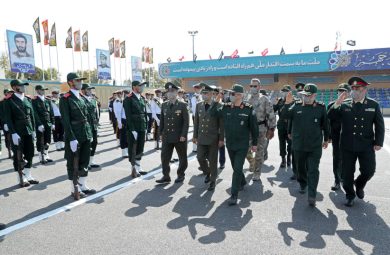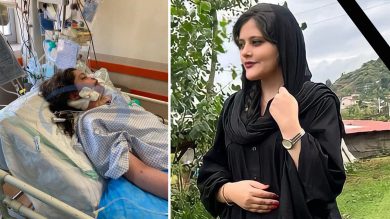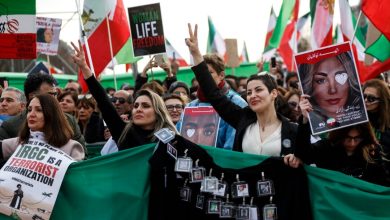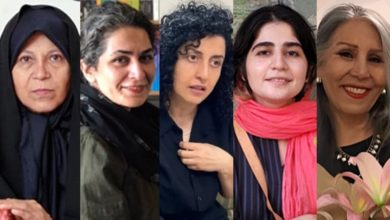The Islamic Revolutionary Guard Corps (IRGC) is one of the most influential and destabilizing forces in the Middle East. Through its extensive network of proxies, financial operations, and military interventions, the IRGC has entrenched itself in regional conflicts and exacerbated political, social, and economic instability. Its actions not only strengthen Iran’s influence but also weaken state institutions, fuel sectarian tensions, and prolong violent conflicts across the region.
This analysis explores the strategies employed by the IRGC to undermine stability in the Middle East and the far-reaching consequences of its actions.
The IRGC’s Regional Objectives
The IRGC operates as an extension of Iran’s foreign policy, with several overarching goals:
1. Expanding Iran’s Influence:
The IRGC seeks to create a “Shia Crescent,” connecting Iran to Lebanon through Iraq and Syria, to enhance Iran’s geopolitical power.
2. Countering Western Influence:
By targeting U.S. and allied interests in the region, the IRGC aims to reduce Western military and political influence in the Middle East.
3. Undermining Rivals:
The IRGC supports militias and proxies to weaken regional rivals such as Saudi Arabia, Israel, and the United Arab Emirates.
4. Strengthening Authoritarian Regimes:
The IRGC backs regimes and groups that align with Iran’s ideological and strategic goals, ensuring loyalty and dependence on Tehran.
Methods of Destabilization
The IRGC employs a variety of strategies to undermine stability in the Middle East:
1. Supporting Proxy Groups
The IRGC’s Quds Force trains, funds, and arms militant groups across the region, using them as proxies to advance Iran’s interests. Key examples include:
• Hezbollah (Lebanon): Hezbollah operates as a state within a state, undermining Lebanon’s sovereignty while posing a constant threat to Israel.
• Houthi Rebels (Yemen): The IRGC provides weapons and training to the Houthis, fueling the conflict with Saudi Arabia and prolonging Yemen’s humanitarian crisis.
• Shia Militias (Iraq): Groups like Kata’ib Hezbollah and Asa’ib Ahl al-Haq, backed by the IRGC, challenge Iraq’s government and target U.S. forces, contributing to political fragmentation.
2. Fueling Sectarian Divisions
The IRGC exacerbates sectarian tensions between Sunni and Shia communities, using these divides to weaken states and bolster its proxies. This tactic is evident in:
• Syria: Supporting Assad’s Alawite regime against predominantly Sunni opposition forces.
• Iraq: Backing Shia militias that alienate Sunni populations and foster resentment.
3. Arms Proliferation
The IRGC supplies advanced weaponry, including ballistic missiles and drones, to its proxies. This arms proliferation destabilizes the region by increasing the lethality of conflicts and enabling attacks on civilian infrastructure:
• Missile Attacks on Saudi Arabia: The Houthis have launched missile and drone attacks on Saudi oil facilities with IRGC-supplied technology.
• Hezbollah’s Arsenal: The IRGC has provided Hezbollah with an estimated 150,000 rockets and missiles, posing a significant threat to Israel.
4. Economic Exploitation
The IRGC exploits the economic vulnerabilities of war-torn states, establishing smuggling networks and controlling reconstruction contracts. This further weakens local governments and entrenches the IRGC’s influence:
• Syria: The IRGC dominates reconstruction projects, benefiting financially while ensuring Assad’s dependence on Iran.
• Iraq: Smuggling operations and control of key trade routes enable the IRGC to finance its activities and weaken Iraq’s economy.
5. Direct Military Interventions
The IRGC deploys its own forces, particularly the Quds Force, to support allies and proxies in conflict zones. For example:
• Syria: The IRGC’s involvement has been critical to Assad’s survival, turning the tide of the civil war in his favor.
• Iraq: IRGC commanders have coordinated militia operations against ISIS and U.S.
forces, solidifying Iran’s military presence in the country.
Consequences of IRGC Activities
The IRGC’s actions have far-reaching consequences for the Middle East:
1. Prolonged Conflicts
The IRGC’s support for proxies and direct military interventions prolongs wars in Syria, Yemen, and Iraq, leading to massive human suffering and economic devastation.
2. Weakening State Institutions
By empowering militias and undermining central governments, the IRGC erodes state sovereignty and creates power vacuums. This is evident in:
• Lebanon: Hezbollah’s dominance undermines the Lebanese government’s authority.
• Iraq: Shia militias challenge the Iraqi government, weakening its ability to govern effectively.
3. Humanitarian Crises
The IRGC’s involvement in conflicts exacerbates humanitarian crises, displacing millions and leaving entire populations without access to basic services.
4. Threats to Regional and Global Security
The IRGC’s proxies and weapons threaten neighboring states and international shipping lanes, heightening the risk of broader conflicts. Key examples include:
• Attacks on oil tankers in the Persian Gulf.
• Rocket and drone strikes on Israeli and Saudi infrastructure.
The Need for a Unified Response
To counter the IRGC’s destabilizing activities, the international community must take coordinated and decisive action:
1. Strengthen Sanctions
Targeted sanctions on IRGC leaders, proxies, and financial networks can restrict their resources and operations.
2. Support Regional Allies
Providing military, economic, and diplomatic support to regional allies can strengthen their ability to resist IRGC influence.
3. Enhance Counterterrorism Efforts
International cooperation on intelligence sharing and counterterrorism can disrupt the IRGC’s networks and prevent attacks.
4. Hold Iran Accountable
Diplomatic pressure and international mechanisms should hold Iran accountable for the IRGC’s actions, reinforcing global norms against state-sponsored destabilization.
Conclusion
The IRGC’s actions continue to undermine regional stability, fuel conflicts, and threaten global security. Its use of proxies, arms proliferation, and sectarian manipulation has left a devastating impact on the Middle East, prolonging suffering and weakening state sovereignty. Confronting the IRGC requires a unified and sustained international response that addresses both its regional activities and global networks. The cost of inaction is too high, and the time to act is now.
Join Our Newsletter!
Stay informed with the latest updates, news, and ways to take action in the fight for justice and global security. Sign up now to get updates delivered straight to your inbox!





